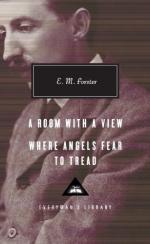Philip assented.
“Caroline feels it as keenly almost as us. That is because she knows the man. Oh, he must be loathsome! Goodness me! I’ve forgotten to pack the ammonia! . . . It has been a terrible lesson for Caroline, but I fancy it is her turning-point. I can’t help liking to think that out of all this evil good will come.”
Philip saw no prospect of good, nor of beauty either. But the expedition promised to be highly comic. He was not averse to it any longer; he was simply indifferent to all in it except the humours. These would be wonderful. Harriet, worked by her mother; Mrs. Herriton, worked by Miss Abbott; Gino, worked by a cheque—what better entertainment could he desire? There was nothing to distract him this time; his sentimentality had died, so had his anxiety for the family honour. He might be a puppet’s puppet, but he knew exactly the disposition of the strings.
They travelled for thirteen hours down-hill, whilst the streams broadened and the mountains shrank, and the vegetation changed, and the people ceased being ugly and drinking beer, and began instead to drink wine and to be beautiful. And the train which had picked them at sunrise out of a waste of glaciers and hotels was waltzing at sunset round the walls of Verona.
“Absurd nonsense they talk about the heat,” said Philip, as they drove from the station. “Supposing we were here for pleasure, what could be more pleasurable than this?”
“Did you hear, though, they are remarking on the cold?” said Harriet nervously. “I should never have thought it cold.”
And on the second day the heat struck them, like a hand laid over the mouth, just as they were walking to see the tomb of Juliet. From that moment everything went wrong. They fled from Verona. Harriet’s sketch-book was stolen, and the bottle of ammonia in her trunk burst over her prayer-book, so that purple patches appeared on all her clothes. Then, as she was going through Mantua at four in the morning, Philip made her look out of the window because it was Virgil’s birthplace, and a smut flew in her eye, and Harriet with a smut in her eye was notorious. At Bologna they stopped twenty-four hours to rest. It was a Festa, and children blew bladder whistles night and day. “What a religion!” said Harriet. The hotel smelt, two puppies were asleep on her bed, and her bedroom window looked into a belfry, which saluted her slumbering form every quarter of an hour. Philip left his walking-stick, his socks, and the Baedeker at Bologna; she only left her sponge-bag. Next day they crossed the Apennines with a train-sick child and a hot lady, who told them that never, never before had she sweated so profusely. “Foreigners are a filthy nation,” said Harriet. “I don’t care if there are tunnels; open the windows.” He obeyed, and she got another smut in her eye. Nor did Florence improve matters. Eating, walking, even a cross word would bathe them both in boiling water. Philip, who was slighter of build, and less conscientious, suffered less. But Harriet had never been to Florence, and between the hours of eight and eleven she crawled like a wounded creature through the streets, and swooned before various masterpieces of art. It was an irritable couple who took tickets to Monteriano.




